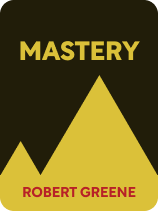
Is “practice” a noun or a verb? In which sense is it more important for someone who’s pursuing mastery?
If you’re a master, you practice your skill. But, you also have a practice. Ultimately, you live and embody a practice. In Mastery, writer and educator George Leonard explains that mastery is not just an ability or an accomplishment; it’s a way of life.
Read more to learn about practice and mastery, according to Leonard.
Practice and Mastery
In the end, the way of the master is practice. Leonard explains that we should understand this word in two ways:
- As a verb, meaning to regularly engage in your chosen skills.
- As a noun, meaning your practice as something you have, live, and embody.
That latter sense is more important, for a master is most interested in practice as an end in itself. In other words, the practice itself is the point and path, and masters live primarily for their practices. Results are secondary to everyday immersion in the essential, ongoing practice and mastery of your skill.
(Shortform note: Here, Leonard’s discussion of the path and the results mirrors Josh Waitzkin’s reflections in The Art of Learning. Similarly to Leonard, Waitzkin contends that the process comes before the results—however, he doesn’t cast results aside altogether. Rather, he recommends that you regularly participate in competitions or similar tests of your skills as a way to see how you measure up against others. This is particularly useful if you’re interested in competitive success, which Waitzkin argues is an important, confidence-building part of any lifelong learner’s journey.)
At first, practice will probably seem tiresome. However, Leonard contends that, over time, it transforms into something deeply alive—a time and space into which the master fully immerses himself in the exploration of the nuances and subtleties of his craft. For instance, you could spend a lifetime exploring the endless scales, chords, intervals, and other musical patterns on the fretboard of a guitar. Even one chord, containing three or four notes, could be “voiced” or played in various ways, placed in myriad positions across the fretboard, and combined with hundreds of other such chords to create thousands of variations, thousands of sounds.
From the basic moves, which the master returns to time and again, to the advanced techniques, this way of approaching practice allows for lifelong cultivation and refinement of your skill.
(Shortform note: To dive beyond Leonard’s advice about your attitude toward practice, consider the notion of deliberate practice as popularized by Anders Ericsson in Peak. Deliberate practice is a distinct form of training in which you measure your actions, use that feedback to adjust what you’re doing, get precise guidance from a coach or mentor, and give maximal effort. Altogether, this helps you refine, for instance, your form for a difficult technique like a three-point jump shot in basketball. This way of practicing, Ericsson argues, is how experts become so good at what they do.)

———End of Preview———
Like what you just read? Read the rest of the world's best book summary and analysis of Robert Greene's "Mastery" at Shortform.
Here's what you'll find in our full Mastery summary:
- How to walk the path of the master by being disciplined in your skill or art
- Why mastery isn't an end goal, but rather a continual process of learning
- Why the master's path is the only guaranteed way to live a fulfilling life






